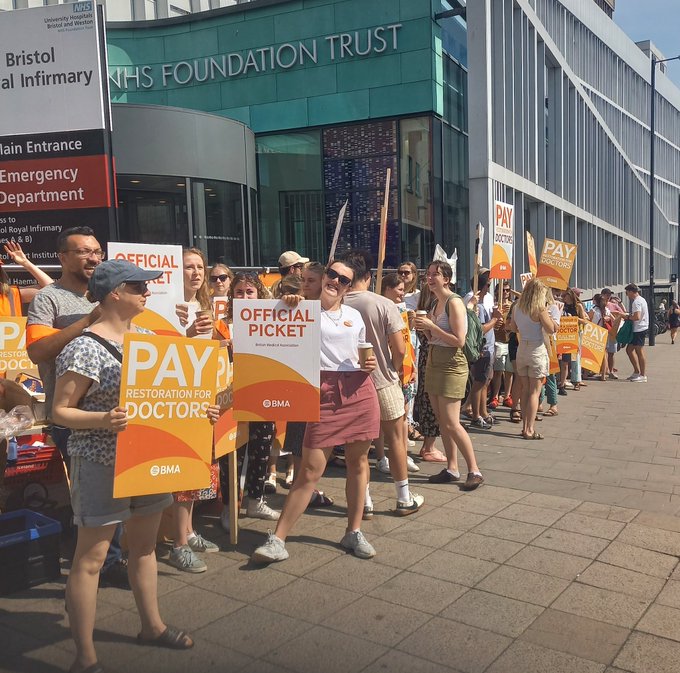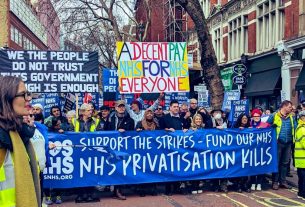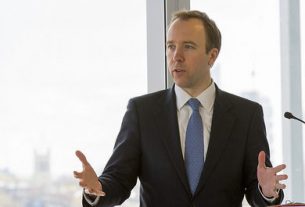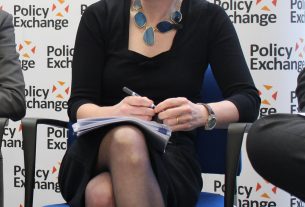The 72-hour strike by junior doctors demanding pay restoration to 2008-2009 levels began this morning at 7 am. The previous strike in April translated into the cancellation of nearly 200,000 appointments, with this walkout likely to have a similar impact on patients. Almost all routine procedures will face disruption. NHS England’s medical director told the Guardian:
“With the sheer number of appointments that need to be rescheduled – it will have an enormous impact on routine care for patients and on the waiting list, as procedures can take time to rearrange with multiple teams involved.”
In April, 27,000 junior doctors joined the strike action, with similar numbers likely to participate in the current walkout. The BMA junior doctors’ committee is set to re-ballot members next week on future strike action. Potentially, members could vote to stage walkouts into 2024. The union wants to hold a three-day strike every month.
Defending the drastic plans, committee co-chair Dr Robert Laurenson told Sky News:
“Our members have given us a clear instruction: they would like us to pursue full pay restoration back to 2008, and that’s what we intend to do in our representation of our doctors and our healthcare system.”
Any strike action will worsen the NHS backlog, currently at a staggering 7.4 million. Medical trusts across England are attempting to bolster the number of consultants on duty to cover the work of striking junior doctors. But many consultants are reluctant to take extra shifts unless they receive their standard pay rates, which many trusts are unwilling to pay.
Having sufficient staff levels at night is of particular concern. Interim Chief Executive at NHS Providers, Saffron Cordery, told the Guardian:
“Staff groups including consultants, paramedics, pharmacists and community matrons will be able to support [services], though there’s a worry around finding adequate night cover.”
Since strike action began, over half a million appointments have been cancelled, with Cordery predicting a worsening situation and urging the government and BMA to resume pay talks:
“This figure will now likely climb in the coming days and weeks, especially if nurses, consultants and radiographers soon vote in favour of industrial action.
“This can’t continue. We risk sleepwalking into a summer of strikes if talks don’t resume as a matter of urgency.”
60-hour weeks and lower relative pay than in 2008
The government’s offer of a 5% pay raise failed to quell the anger among junior doctors. Many work long hours each week while contending with a health system at breaking point. According to the BMA, junior doctors feel “overworked and undervalued”. The 35% wage increase they demand is to make up for the inflation of the last fifteen years, which has reduced junior doctors’ pay in real terms by 26%.
Dr Naru Narayanan, Hospital Consultants and Specialists Association president told the Evening Standard:
“Junior doctors have held together patient care amid a spiralling staffing crisis. In return for this huge emotional, mental and physical toll, they’ve been subjected to a decade of real-term pay cuts totalling over 26 per cent. Enough is enough.
“Our NHS is in an intolerable situation, and junior doctors will not be taken for granted any more. They are taking decisive action for their patients and for their own well-being. Falling pay, increasing workloads and dangerous levels of understaffing have driven carers across the NHS to strike. The blame for this lies solely with a complacent government, seemingly content to let patient care suffer.
Dr Narayanan urged the government to “act now to negotiate a proper pay increase as part of a wider funding package for the NHS.”
Health secretary Steve Barclay accused junior doctors of walking out of talks and turning down a reasonable pay increase. But junior doctors disagree.
“They either don’t understand the impact of continued pay erosion on morale and retention, or they do understand and they simply don’t care”
Co-chair @_VivekTrivedi speaking on @BBCBreakfast this morning about the government’s negotiating position#JuniorDoctorsStrike pic.twitter.com/LaDnPKsScZ
— Junior Doctors (@BMA_JuniorDocs) June 14, 2023
A Department of Health and Social Care spokesperson said:
“We hugely value the work of junior doctors, and we have been clear that supporting and retaining the NHS workforce is one of our main priorities. As part of a multi-year deal, we agreed with the BMA, junior doctors’ pay has increased by a cumulative 8.2 % since 2019/20. We also introduced a higher pay band for the most experienced staff and increased rates for night shifts.
“The Health and Social Care Secretary has met with the BMA and other medical unions to discuss pay, conditions and workload. He’s been clear he wants to continue discussing how we can make the NHS a better place to work for all.”
For his part, Steve Barkley tweeted:
I want to thank all NHS staff working incredibly hard this week to care for patients and cut waiting lists while @TheBMA continue strikes.
We will resolve this dispute by negotiating in good faith and seeking a reasonable outcome together.
Our position explained on @SkyNews 👇 pic.twitter.com/p38nbj0PNd
— Steve Barclay (@SteveBarclay) June 14, 2023
Contrary to his views, the bulk of the British public support NHS staff strike action.




